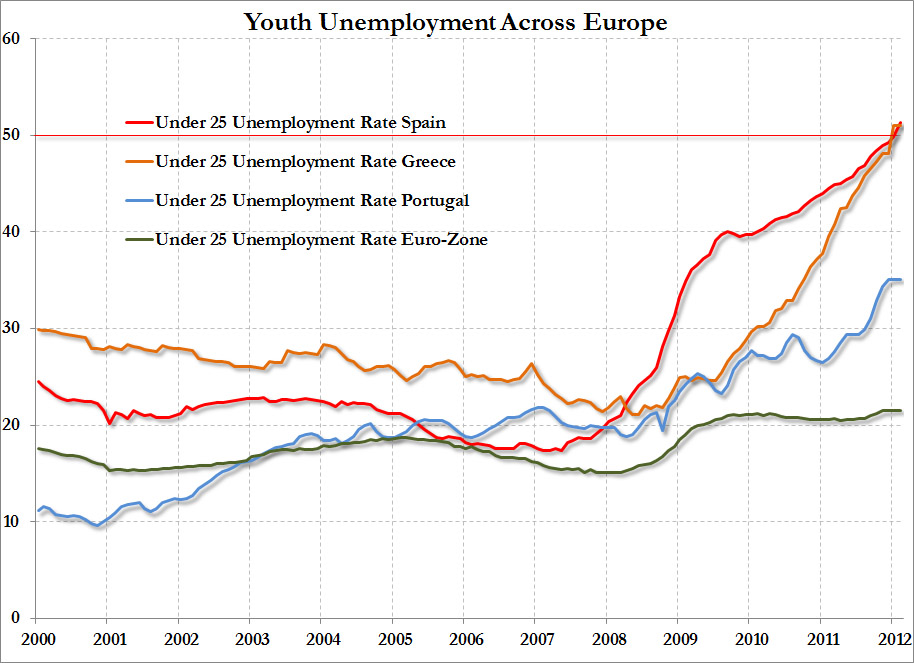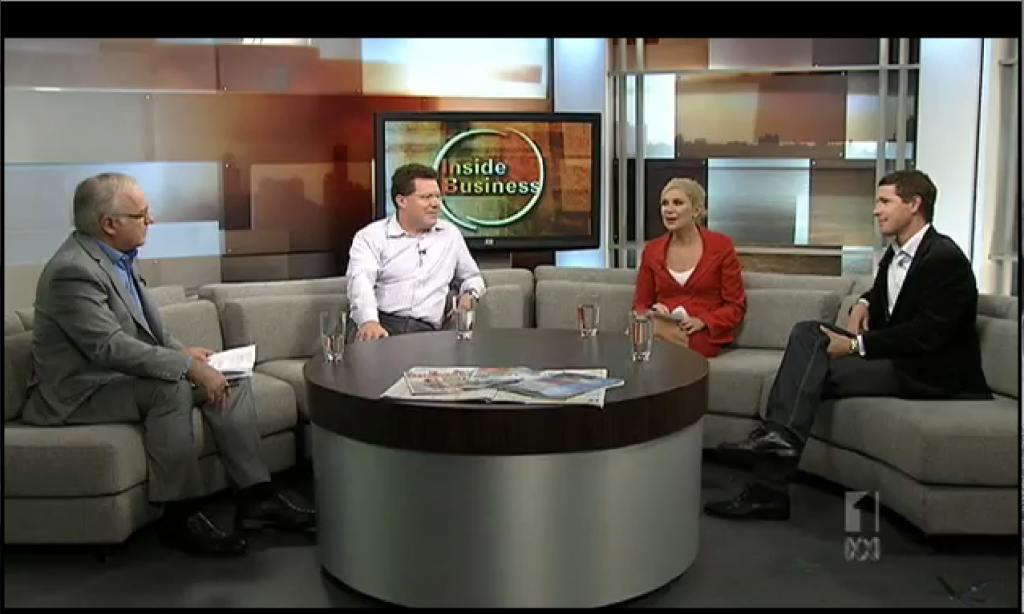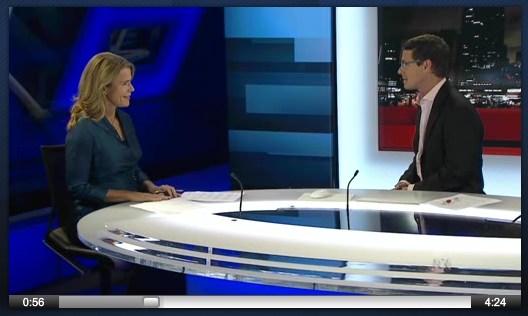Value Investing ‘on air’.
 A busy week last week for value investing. Presenting in Perth for the ASX and in Melbourne as well as chatting to Ross Greenwood and Ticky Fullerton as I do regularly has cemented in my mind the idea that the case is building for a protracted de-leveraging (Click the European youth unemployment chart at left). I will bring you more about this de-leveraging vs recession idea soon as well as what I believe it means for share portfolios but for now I thought you might like a shortcut to some of the chats. And of course, all proudly brought to you by my very good friends at Skaffold.
A busy week last week for value investing. Presenting in Perth for the ASX and in Melbourne as well as chatting to Ross Greenwood and Ticky Fullerton as I do regularly has cemented in my mind the idea that the case is building for a protracted de-leveraging (Click the European youth unemployment chart at left). I will bring you more about this de-leveraging vs recession idea soon as well as what I believe it means for share portfolios but for now I thought you might like a shortcut to some of the chats. And of course, all proudly brought to you by my very good friends at Skaffold.
The subject came up with Alan Kohler last weekend on the ABC’s Inside Business. You can watch it by clicking here
It also came up on the ABC’s The Business with Ticky Fullerton, which airs at 8.30pm and just after 11pm Monday to Thursday. You can watch it by clicking here
And finally, here is the talk I gave recently for the ASX Investor Hour. You can simply click on the video below to watch the seminar or click HERE to view the seminar with slides.
There’s plenty to think about and stay tuned to find out what stocks we have been buying in the most recent quarter. If you are looking for hot tips you are at the wrong blog, as we may have bought the stocks I mention as being worthy of careful study as many as three months ago. And sadly, we have already benefited greatly from someone spruiking some of these stocks online and I am told by one CEO that they have been reported to ASIC.
Posted by Roger Montgomery, Value.able author, Skaffold Chairman and Fund Manager, 11 March 2012.


Rici Rici
:
The risk of de-leveraging is also a significant risk in my opinion in relation to the long term holding of gold as an investment.
The gold ‘bugs’ out there are looking at the printing of money by central banks, and using this ‘fact’ as the premise for holding gold ‘AT ANY PRICE’ as a hedge against inflation.
Yet what if the printing of money just alleviates the deflationary impact caused by global deleveraging.
The US Fed has stated quite clearly that its monetary expansion is within its dual mandate, one of them being low inflation at a rate of 3% odd. If this money pumping excercise is only generating inflation of 3%, then the continued parabolic rise in the price of gold is not sustainable on an inflation basis.
Of course if central bank printing does lead to higher levels of future inflation, then gold’s price will justifiably go higher. But how can we know this? how can we price this? Speculation that this may happen is not justifiable reason to price it into current circumstances.
Rici Rici
:
Fantastic topic and one that i think is very relevant to the times.
I believe that the world is seeing and has seen a structural shift towards increased savings post the GFC. Now structural changes when they occur represent dangerous times for investing. Investment ideas and methods that performed well prior to that structural shift, wont necessarily work in the new era of structural change.
This is very important in my opinion, especially for value based investors as there is an increased risk of value traps during this period (just look at the retail sector). These value traps arise because investors are comparing current data with historical data and attempting to extrapolate into the future. Yet the structural change could render that historical data meaningless. Essentially one should be viewing things as from year zero and then create a hypothesis going forward. That hypothesis has to take into account the structural change.
It also leads to a required re-assessment of investment criteria that is used to evaluate investment opportunities (maybe not so much for a ROE approach, but especially for those criteria that compare current ratio’s to historic ratios, eg PE ratios).
Consideration must be given to the ‘pool’ of investment stocks in light of this change. A period of deleveraging will be compatible with the continuation of a secular bear market as the ‘macro’ times are against the ‘rising of all boats’. Within that secular bear market, there will of course be individual cyclical bull and bear phases. But a long term ‘buy and hold’ of the overall indicies won’t produce very satisfactory results.
Therefore investment returns will be dictated primarily by
(a) individual stock selection; and
(b) the ability to enter and exit at appropriate times.
When it comes to individual stock selection, i believe the following characteristics will be good starting points, from which to investigate further:
(a) companies that do not rely on a macro leverage/deleverage environment. Companies that provide
(i) essential services
(ii) non-discretionary items
(iii) enable other companies to succeed in the current environment (think companies that help other companies reduce their cost of doing business, increase efficiency, increase marketing productivity, increase market penetration using new technology)
(iv) assist others with deleveraging (think debt assessment/recovery, insolvency, re-organisation, streamlining etc etc)
(b) companies that have very high barriers to entry due to something unique. This will enable them to grow market share in a declining or stagnant overall market. They will profit through the elimination of weaker players. They will better be able to maintain pricing power, such that even if their product prices are not increasing, they can benefit from stable prices with reduced input costs (as weaker input suppliers reduce their prices) (think woolworths/safeway with their downwards pressure on supplier prices)
Roger Montgomery
:
Great stuff Rici. Thanks for sharing.
Andrew
:
Good on that CEO for reporting the spruiker to ASIC. Retail investors get so easily influenced by people, seeing how your fund is into it as well means that at least this company is at least investment grade rather than some tiny company no-one has heard of, never made a profit and never will.
i look forward to hearing your talk on the whole de-leveraging vs recession idea. I have to admit that i haven’t thought all too much about it. I tend to think very little about macro issues and instead focus completley on the company i am interested in which could be a good or bad thing but as i am likely to hold these companies over a cycle then i think it serves me well.
Got your podcast on my iphone through the itunes store and will give it a listen today (look for “buying opportunities” in the ASX investor hour podcast. Should be the newest one). For those who haven’t heard his presentations before, i thoroughly recommend them. They are clear, informative and entertaining.